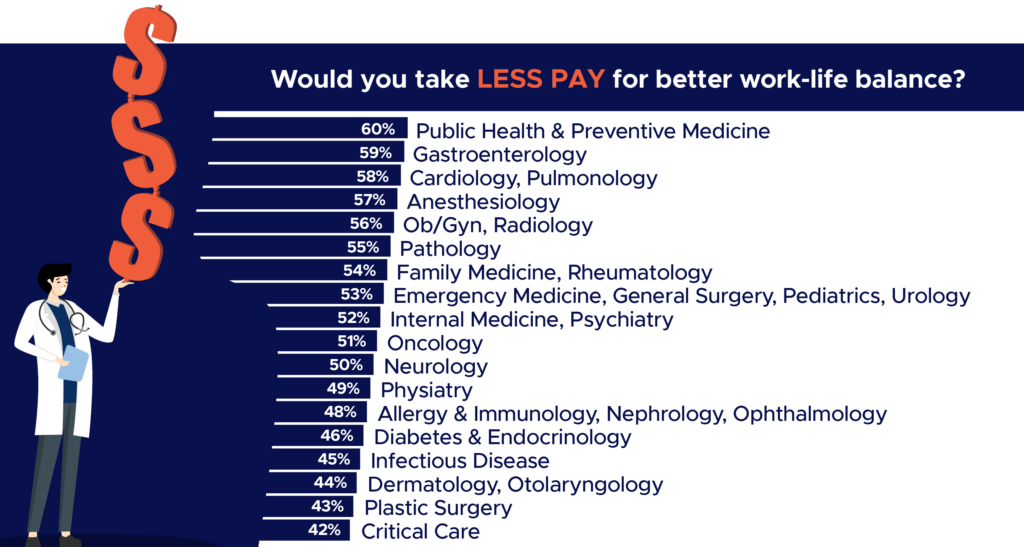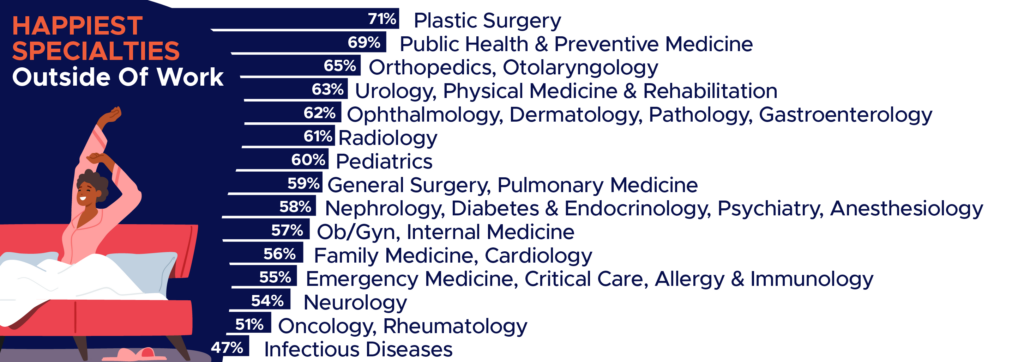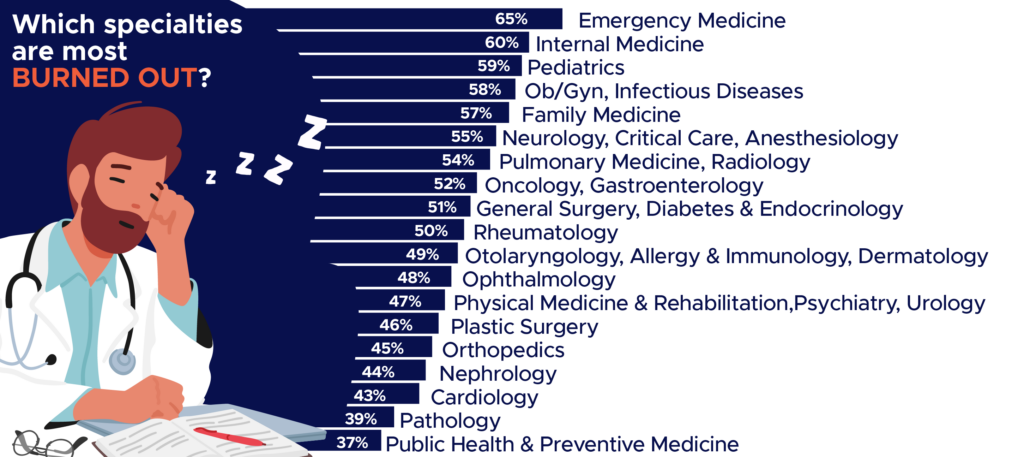It’s no secret that doctors work hard. Long hours and overnight shifts could make it challenging for physicians to feel satisfied in both their professional and personal lives, but not all medical specialties are created equal when it comes to work-life balance.
Let’s dive into work-life balance and which doctors have the best work-life balance by examining happiness, burnout, and salary.
What is work-life balance?
Work-life balance refers to the equilibrium an individual seeks between their professional responsibilities and personal life. We know the term “work-life balance” has its flaws and is incredibly subjective to each individual lived experience but it is important to try and shed some light on what it is like to work in different specialties.
Would doctors take less pay for better work-life balance?
According to Medscape, 53% of physicians would take a pay cut in exchange for better work-life balance, down slightly from 55% in 2022. When average American workers were surveyed by the National Bureau of Economic Research, only 40% said they would take less pay.
Prior to the pandemic, physicians were less likely to want to take less pay for better work-life balance, with a slight majority of doctors in 2019 and early 2020 saying they would not take less pay. The sentiment flipped in 2021 and continued in 2022.
Why are doctors more willing to take a pay cut? Medscape says this could be because of the demands of medicine or because doctors’ higher income gives more leeway for a pay cut.
Physicians’ willingness to take less money for better work-life balance varies by specialty.

Public Health & Preventive Medicine – 60% answered “yes”
Gastroenterology – 59%
Cardiology – 58%
Pulmonology – 58%
Anesthesiology – 57%
Ob/Gyn – 56%
Radiology – 56%
Pathology – 55%
Family Medicine – 54%
Rheumatology – 54%
Emergency Medicine – 53%
General Surgery – 53%
Pediatrics – 53%
Urology – 53%
Internal Medicine – 52%
Psychiatry – 52%
Oncology – 51%
Neurology – 50%
Physiatry – 49%
Allergy & Immunology- 48%
Nephrology – 48%
Ophthalmology – 48%
Diabetes & Endocrinology – 46%
Infectious Disease – 45%
Dermatology – 44%
Otolaryngology – 44%
Plastic Surgery – 43%
Critical Care – 42%
Which specialties are happiest outside of work?
Let’s start by first looking at which specialty is the happiest outside of work. According to Medscape, plastic surgeons most often report being “happy” or “very happy” outside of work (71%). Infectious disease physicians reported being “happy” or “very happy” the least of any other specialty, just 47%.

Plastic Surgery – 71% answered “yes”
Public Health & Preventive Medicine – 69%
Orthopedics – 65%
Otolaryngology – 65%
Urology – 63%
Physical Medicine & Rehabilitation – 63%
Ophthalmology – 62%
Dermatology – 62%
Pathology – 62%
Gastroenterology – 62%
Radiology – 61%
Pediatrics – 60%
General Surgery – 59%
Pulmonary Medicine – 59%
Nephrology – 58%
Diabetes & Endocrinology – 58%
Psychiatry – 58%
Anesthesiology – 58%
Ob/Gyn – 57%
Internal Medicine – 57%
Family Medicine – 56%
Cardiology – 56%
Emergency Medicine – 55%
Critical Care – 55%
Allergy & Immunology – 55%
Neurology – 54%
Oncology – 51%
Rheumatology – 51%
Infectious Diseases – 47%
Gastroenterology – 59%
Cardiology – 58%
Pulmonology – 58%
Anesthesiology – 57%
Ob/Gyn – 56%
Radiology – 56%
Pathology – 55%
Family Medicine – 54%
Rheumatology – 54%
Emergency Medicine – 53%
General Surgery – 53%
Pediatrics – 53%
Urology – 53%
Internal Medicine – 52%
Psychiatry – 52%
Oncology – 51%
Neurology – 50%
Physiatry – 49%
Allergy & Immunology- 48%
Nephrology – 48%
Ophthalmology – 48%
Diabetes & Endocrinology – 46%
Infectious Disease – 45%
Dermatology – 44%
Otolaryngology – 44%
Plastic Surgery – 43%
Critical Care – 42%
How is burnout affecting physicians?
According to Medscape, 53% of physicians said they are burned out, and 23% of physicians reported they are depressed, but levels of burnout vary by specialty.

Emergency Medicine – 65% answered “yes” to feeling burned out
Internal Medicine – 60%
Pediatrics – 59%
Ob/Gyn – 58%
Infectious Diseases – 58%
Family Medicine – 57%
Neurology – 55%
Critical Care – 55%
Anesthesiology – 55%
Pulmonary Medicine – 54%
Radiology – 54%
Oncology – 52%
Gastroenterology – 52%
General Surgery – 51%
Diabetes & Endocrinology – 51%
Rheumatology – 50%
Otolaryngology – 49%
Allergy & Immunology – 49%
Dermatology – 49%
Ophthalmology – 48%
Physical Medicine & Rehabilitation – 47%
Psychiatry – 47%
Urology – 47%
Plastic Surgery – 46%
Orthopedics – 45%
Nephrology – 44%
Cardiology – 43%
Pathology – 39%
Public Health & Preventive Medicine – 37%
Finding The Balance
The term work-life balance oversimplifies a very complex topic, especially for doctors. Finding the right mix for you is entirely subjective and can change throughout different life stages.
While the medical profession is inherently demanding, certain specialties offer a more balanced lifestyle for physicians. Choosing a specialty that aligns with personal preferences, interests and priorities can significantly impact a doctor’s work-life equilibrium.
Reviewing the results of these surveys can help you learn which specialties align most closely with your needs and wants. Ultimately, finding the right balance requires thoughtful consideration of individual values, interests, and goals within the dynamic field of medicine.
For more doctor-specific mental health resources, visit our Resources Library or check out one of our curated resources:





